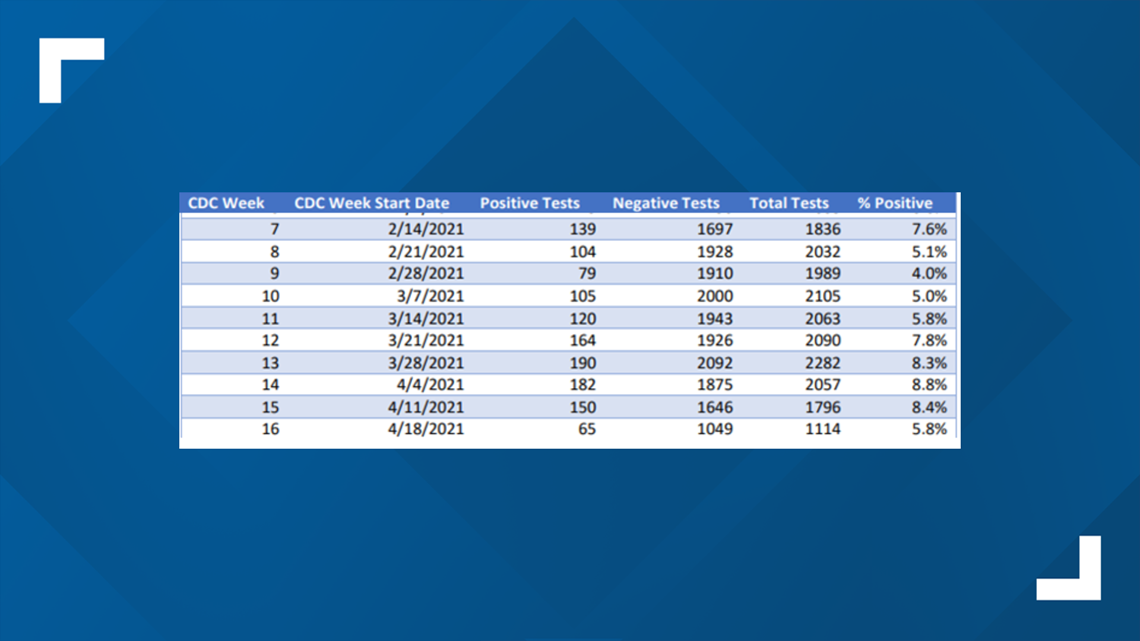ST. LOUIS COUNTY, Mo. — There's been a persistent drop in testing for COVID-19 and the trend is happening across the St. Louis area.
"We have seen a decline in testing for Lincoln County overall," a spokesperson for the Lincoln County Health Department said. "The current daily averages for total tests are 62 (PCR) and 50 (Antigen)."
5 On Your Side spoke to the Chief Medical Officer at Total Access Urgent Care Dr. Troy Dinkel, who said they've seen a drop-off, too.
The height was in November with 1,500 tests daily. That's gone down every month and in April, it's about 850 tests.
In Jefferson County, a spokesperson also said its total number of PCR tests for its testing this past week was about 50% less than the number of PCR tests performed 3 weeks ago.


Head of the St. Louis County Health Department Dr. Faisal Khan said it's gone from an average of 260 tests being conducted at the Department of Public Health per day in November to 37 tests per day in April. Tests conducted by other medical providers are down in the county as well.
It's concerning for County Executive Sam Page.
"The truth is more than 130 people contract COVID-19 every day in St. Louis County," he said.
POSSIBLE REASONS
There could be numerous reasons why this is happening.
"There is complacency creeping into people’s mindset," Dr. Khan said. "There’s also a false sense of security with the arrival of the vaccine."
He also believes people could be experiencing symptoms, but not getting tested.
"They want to go back to regular life, they’re fatigued, they already had COVID," Dr. Dinkel said.
5 On Your side spoke to the head of the St. Louis Pandemic Task Force in the beginning of April, asking about possible reasons.
Dr. Alex Garza explains one could be not wanting to go through the issues of testing positive and having to quarantine/isolate.
The vaccine is another factor.
"If you think who's vaccinated so far, it's a lot of people at risk," Dr. Alex Garza said. "So, the younger population that doesn't have such severe symptoms, they aren't wanting to get tested."
With immunity up, testing can go down too.
But Dr. Garza worries that people may be feeling under the weather.
"What's concerning is if people are symptomatic and not getting tested. That will continue to drive transmission, that's when you get stuck at these plateaus with not seeing a decrease in cases," he said.
THE IMPORTANCE
Dr. Khan explains testing is vital so the rate of infection can be detected.
This can also prevent spikes from happening.
"A high volume of people getting tested gives you confidence the picture we are seeing is the true reality," he said.
While testing numbers are down, the virus is still attacking.
"We still have in the region 40 patients coming to hospital every day and it hasn’t improved since February," Washington University Dr. Bill Powderly said.
He said this shows a steady rate of infection in the community.
In his Wednesday news briefing, Page talked about how the positivity rate is affected by the numbers of tests that are performed in the community.
"The positivity rate is one of the many variables our public health experts look at," Page said.
Dr. Kahn said St. Louis County's positivity rate hovered at 8 to 9% beginning of April.
Right now, it's at 6%.
CDC leaders recommend loosening restrictions when the positivity rate drops below 5%.
"If people don't get tested in large enough numbers, then we are blinded to our response to containing it," Dr. Kahn said.
That causes a ripple effect with contact tracing and isolation measures.
And you're probably wondering with vaccines in the picture, it could help.
But right now, just 26% of Missourians have completed vaccination, meaning more than 70% of people are still left.
That's why Dr. Khan says the testing component is key currently, as vaccine numbers increase.

